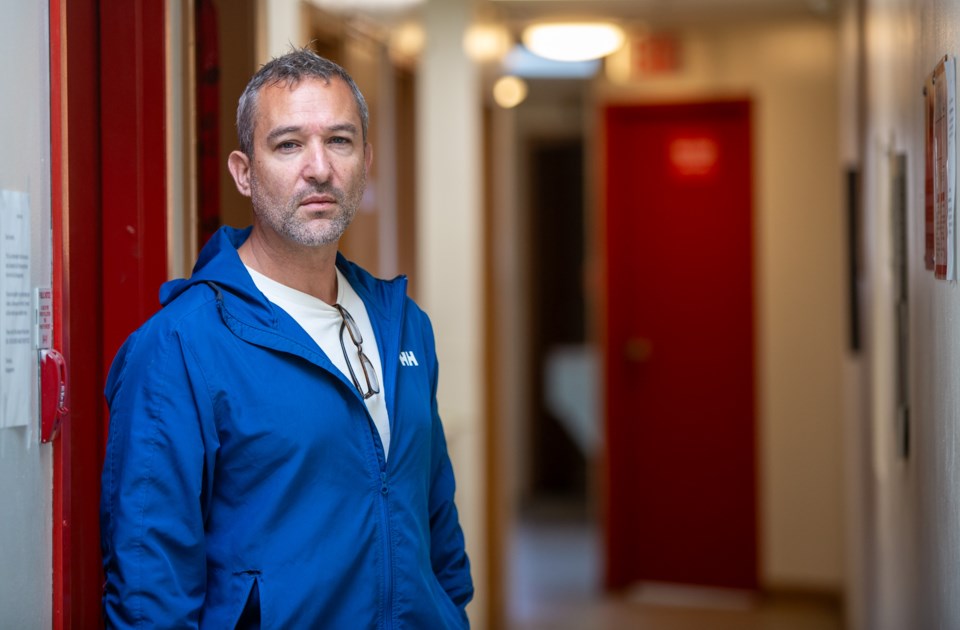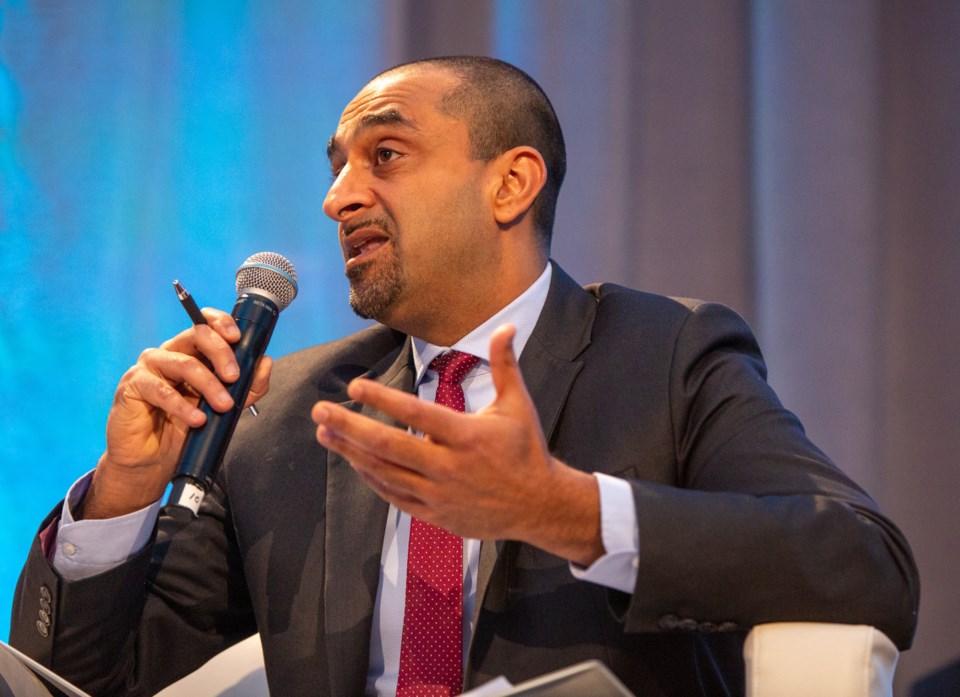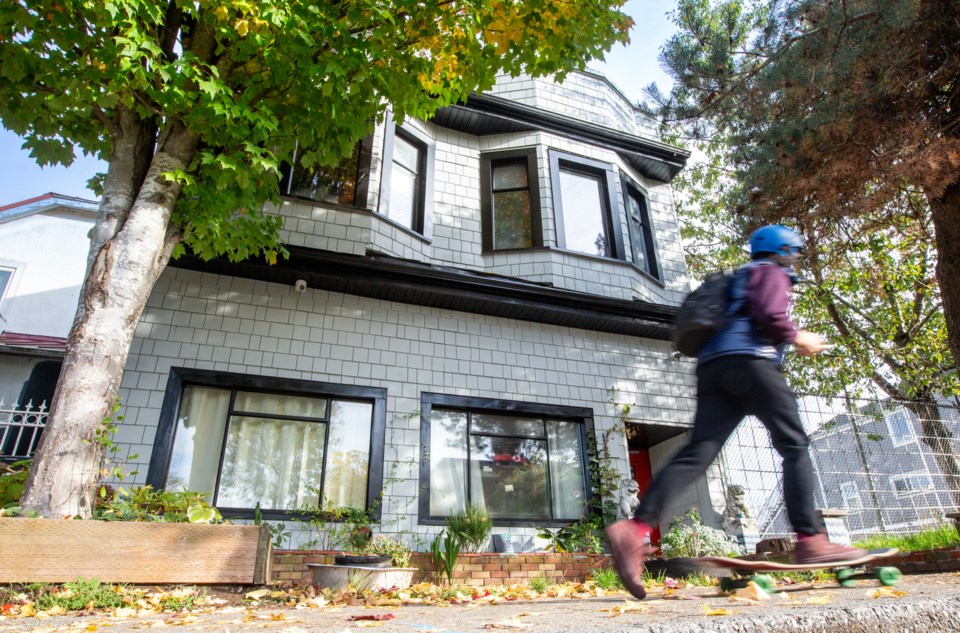As Peter Thanas sees it, he is providing accommodation at his 30-room apartment building in Strathcona for some of the most vulnerable people in the city — and at a reasonable price.
Former shelter users, newcomers to Canada, young couples and seniors have been part of the tenant mix since Thanas bought the Pender Lodge at 431 East Pender St. in 2015.
During a walk-through of the three-level, century-old building, some of those tenants opened their doors to Thanas and shared their thoughts about the place and how much they paid in rent.
Robin Savard moved in six years ago from a shelter. He pays $650 per month.
“It’s only gone up $50 in six years — that’s not bad at all, and it includes cable,” Savard said.
Harry Rensby, 77, said he only planned to stay one night, but has remained in his room with a view of the street for 13 years. He pays $700, but is anticipating a three per cent rent increase next year.
“The situation here is a lot more civilized than some of the lower-end places,” said Rensby, adding that the price of rent was reasonable for the type of accommodation and neighbourhood.
Thanas said he has tried to avoid annual rent increases for his long-time tenants, knowing affordable housing is difficult to find in one of the most expensive cities in the world.
But now, he said, he is forced to start increasing rents across the board.
That’s because he is no longer allowed to boost the rental price of a suite after a tenant moves out.
Often referred to as vacancy control or rent control, the new law states an owner of a single-room-occupancy (SRO) building in the Downtown Eastside must keep rent at the same price for a new tenant as the previous tenant.
The law doesn’t affect the annual allowable rent increase set by the provincial government, which is three per cent next year. But it’s now the main mechanism Thanas and other SRO owners rely on to bring in more income.
'Protect rent affordability'
In May, the provincial government introduced amendments to the Municipalities Enabling and Validating Act (MEVA) at the request of the City of Vancouver “to enable the city to regulate SRO vacancy control to protect rent affordability for tenants that include some of the city’s most vulnerable residents.”
The government’s rationale, which it stated in a news release, was to protect tenants from “some bad actors who are using pressure tactics on tenants to leave their rental units so they can hike the rent, leaving them with nowhere else to live.”
The government estimated the new law would prevent up to 1,000 people from losing their homes, although names of buildings and tenant populations weren’t disclosed in the release.
The government’s move came less than two years after the city lost a high-profile court case over vacancy control, where judges in the B.C. Supreme Court and later the Court of Appeal sided with two landlords.
Thanas was one of them.
The other was Philip Kim, who owns what the court described as a high-end 60 “micro-suite” building in Gastown, which fell under the city’s classification of single-room accommodation, and therefore subject to vacancy control.
Thanas and Kim filed separate petitions to the court, but agreed to have their arguments heard together.
'No option but to quash the bylaws'
The ruling in August 2022 was clear: despite the city’s decision in December 2021 to adopt vacancy control, Supreme Court Justice Karen F. Douglas concluded that owners cannot be regulated twice — once by annual allowable rent increases and second by a city-driven bylaw to impose vacancy control.
“I agree with the petitioners that the city is prohibited from legislating, by using its business licensing power, to regulate persons who are already subject to regulation by the province, directed at the same dominant purpose, even if it is possible to comply with both legislative schemes,” Douglas wrote.
The Appeal Court’s three judges agreed in a February 2024 ruling, with Justice Joyce DeWitt-Van Oosten writing:
“I agree with the judge that there is only one reasonable interpretation of [the Vancouver Charter] and the city does not have legislative authority to regulate rent increases between tenancies for residential units. As well‑intentioned as the bylaws may have been, they were not intra vires the city’s legislative jurisdiction and the decision to adopt them was therefore unreasonable. The judge had no option but to quash the bylaws.”

'Wrongdoing or overreach'
Thanas thought his $150,000 fight was over, and that he could carry on with his business.
But then he heard Ravi Kahlon — B.C.’s housing minister at the time — announce in May that Pender Lodge would again be subject to vacancy control. Thanas was blindsided by the news.
“We followed the appropriate legal protocols where we put our trust in the judicial system, only to have it overridden by the housing minister,” he said.
“The province amended the Municipalities Act to retroactively go back in time, expunge the city of any municipal abuse of power, wrongdoing or overreach — or whatever you want to call it — to give them their vacancy control.”
Added Thanas: “I would say that we felt like we had the rug pulled out from under us. Obviously, that's not a very good feeling, especially after spending all that money. I just want to mind my own business, run my building free and clear of stifling red tape, and that's exactly what [this act] is.”
Thanas said the province’s decision to impose vacancy control was even more curious, considering the B.C. government did not participate in the legal battle; excerpts from the ruling show it opposed city council’s push for vacancy control.
The government’s position at the time was based on a recommendation from the B.C. Rental Housing Task Force, which listed reasons in its final report for rejecting such legislation.
The task force said it heard a strong desire from some renters and renter advocates to improve affordability by tying rent increases to the unit, not the tenant. They felt that this would help end wrongful evictions intended to raise rents beyond the allowable maximum, the report said.
But the task force also heard concerns from rental housing providers that a change of this kind would make it challenging for them to cover their costs, with some considering selling and, therefore, removing their property from the rental stock.
“Rental housing developers said that they would cease developing needed rental units if this change was brought in, as it would make their developments unaffordable to build,” the report said.
“Concerns were also raised about the large amount of paperwork and bureaucracy that would need to be created to implement such a system.”

'Cease all my relationships'
The effect on the Pender Lodge has been rent increases for tenants, delays or cancelling of repairs and renovations and a sour relationship with the city, according to Thanas, who described himself as “one of the good guys.”
For years, he said he has had a good relationship with various shelter providers and has opened up rooms for people in need. To that end, he provided a letter to Glacier Media that he presented in court on behalf of a tenant to get him released from jail.
During the pandemic, he said, he also used his contacts to help place homeless people in other buildings.
That relationship has ended.
“The bylaw has forced me to cease all my relationships with the City of Vancouver, shelters and all these other organizations,” he said, noting other SRO owners have done the same.
“Call it out of protest, call it whatever you want to call it. But [the implementation of vacancy control] doesn't incentivize anybody to want to partner up with the city to house people.”
Added Thanas: “It's very obvious the City of Vancouver is attempting to shift that economic burden of housing people onto the private landlord. They're forcing us to subsidize housing for people. That's the bottom line. We're market housing providers. We need to be able to charge market rent to cover market expenses.”
Dumpster fire arson
He said he saves on operational costs by doing much of the maintenance and repairs, including recently adding new siding to the front of the building. He spent $20,000 on materials to repair the back of the building after someone set fire to a dumpster in the alley.
“I could barely get the job done because of all of our expenses in the court system,” he said, standing on the sidewalk outside the building’s front doors. “I managed to finish this on a shoestring budget, and I want to do the side of the building and the back to create a nice, dignified building to live in.”
Added Thanas: “I'm the one physically doing the work. But if I had to pay somebody else to do the work, we'd be underwater. I mean, we just got quotes to renovate the [shared] bathrooms, and it's like $12,000.”
At the time of Thanas’ initial legal challenge, court documents indicate average rent at Pender Lodge was $563 per month. Thanas had not raised rents for any tenant since 2017 but had increased rent between tenancies, the court heard.
“The cumulative average of these rental increases is approximately 2.5 per cent per year,” the document said.
“Despite this rent increase, net income for the building remained flat between 2017 and 2021. On Pender Lodge’s uncontroverted evidence, fixed costs for the building [excluding the mortgage] increased by 34.87 per cent over the last five years while rental income for the same period increased by only 12.5 per cent.”
Private SRO stock
The private SRO stock in Vancouver decreased from 7,830 rooms in 1994 to 3,305 rooms in 2023. The Downtown Eastside had the highest rate of loss, although some of those rooms were acquired by governments and non-profits.
That information was published in a city staff report in 2023.
The downtown core low-income housing report said the average rent in privately owned SROs in Vancouver was $681 — an increase of 21 per cent, or $120 over what it was in 2019.
The report said when a calculation of average rent was done without including what tenants paid at Chinese benevolent society-run SROs or private hotels operated by non-profits, the cost was actually $736 per month.
The city based the calculation on rent data collected from 62 privately owned and operated SROs, five private hotels operated by a non-profit and seven buildings owned and operated by Chinese benevolent societies.
“Although a large portion of the private SRO stock continues to be more affordable than average rents in a new market rental studio in the same neighbourhood, the term ‘low-income housing’ for SROs is becoming increasingly inaccurate as average rents escalate far beyond the reach of low-income residents,” the report said.
DTES SRO Collaborative
The findings of the city report and council’s rationale for vacancy control have been referred to — and long supported by — the Downtown Eastside SRO Collaborative, which called the provincial government’s move in May to restore vacancy control “a historic moment.”
In a news release, the Collaborative’s executive director Wendy Pedersen described vacancy control as “the crucial first step to prevent more people from slipping into the life-altering chaos that people experience when they lose their homes.”
Richard Schwab, SRO Collaborative president and tenant at the Arlington Hotel, said at the time that he would sleep more soundly thanks to the city and the province.
“I look forward to what’s next, working to get all levels of government on board for investments, get landlords on board, get SRO buildings bought and renovated,” Schwab said.
The Collaborative’s push for vacancy control since 2015 combined with then-city councillor Jean Swanson’s advocacy in 2019 in the council chamber to adopt a bylaw is well known.
That push has also been supported by the current council, with Mayor Ken Sim quoted in a government news release saying the bylaw “is crucial for protecting low-income SRO tenants, who often find these accommodations to be their last available option before homelessness.”
An extension of the campaign for vacancy control is the incorporation in 2023 of the Downtown Eastside Community Land Trust, which has the stated goal of acquiring property for permanent use as deeply affordable community-owned housing.
“This would protect the property from changes in the real estate market that can cause rents to increase,” according to information on the Canada Mortgage and Housing Corporation’s website.
“It would also ensure the property remains available for community use and enable community-specific housing, such as urban Indigenous housing.”
The Collaborative was among the original coalition members to develop the land trust.
'Value would decrease'
For Thanas, it’s more evidence the city’s goal — coupled with lobbying efforts by the Collaborative and other advocates — has been to put him and other private SRO owners out of business, or at least devalue their investments.
He provided a copy he obtained of an email authored by Swanson’s assistant in July 2020 to support his argument.
“With vacancy control in SROs, [a building’s] value would decrease, and it would be less expensive for the province to buy them to keep them in the public realm, improve management and prevent homelessness,” said the email, which was sent to a staff member in the housing minister’s office.
Reached Tuesday, Swanson said she continues to support vacancy control, sharing a story from a tenant of an SRO who thanked her for advocating for the bylaw.
“He was so relieved that we had vacancy control now,” she said. “He had actually ended up in the hospital with heart issues every time the landlord tried to get rid of them. He attached to his email a little handwritten thing that said, ‘coupon good for one favour.’”
While the original vacancy control bylaw claimed to “slow” private investment in SROs, the reality is that it has “completely eliminated such investment,” leaving only the government and government-funded non-profits as potential buyers, Thanas said.
Thanas said he is not interested in selling the Pender Lodge.
“That was never my purpose in the beginning, it was never my stated goal,” he said.
“I'm actually an investor. I'm not a speculator. That's not what I am. I don't flip properties. But if we wanted to dispose of this property on the free market, we can't. There is no market for it. There are no private buyers willing to purchase a property like this with this amount of red tape attached to it.”
Meanwhile, Thanas said he is again exploring legal options to combat vacancy control, but wouldn’t elaborate.
B.C. election Oct. 19
Thanas’ concerns come only a few days before British Columbians will learn whether David Eby and the NDP will return to lead government.
The election is Oct. 19.
Kahlon is seeking re-election and, if he secures another term, he could likely continue as housing minister.
Glacier Media requested an interview with Kahlon regarding vacancy control, but he wasn’t available. Instead, NDP communications staff sent an email on Kahlon’s behalf in which he said, in full:
“David Eby and the BC NDP made these changes at the request of the City of Vancouver to prevent some of our most vulnerable neighbours from losing their homes due to escalating rents.
“Too often people were being exploited by some bad actors who were pressuring tenants to leave their rental units and turning them out on the street just so they could hike the rent.
“David Eby has been clear that we’re moving toward purpose-built rental whenever possible, to ensure people currently living in SROs can transition to the same safe, secure, and functional housing that we want for all British Columbians.
“While we’re always happy to sit down and work together, we have no intention of removing these protections that are preventing as many as 1,000 people from losing their homes.”
The Conservative Party of B.C. had not responded to a request made Oct. 9 for its position on vacancy control. The email request was also copied to Elenore Sturko, who was B.C. United’s housing critic until she joined the Conservatives before the campaign.






